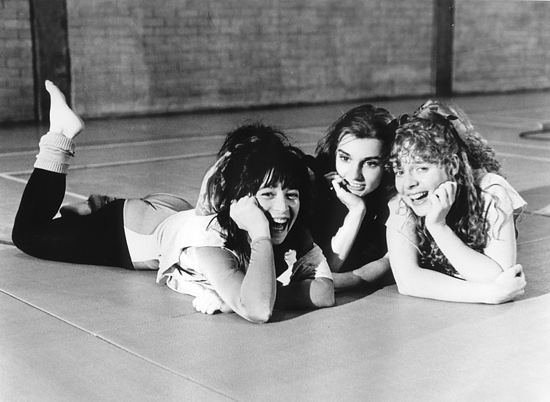Besom Productions

Hush-A-Bye Baby
Director: Margo Harkin
Producer: Tom Collins
Production: Derry Film & Video Workshop (1990)
Broadcasters: Broadcast on 20 September 1990 on RTÉ, broadcast on 6 December at 9.00pm on Channel 4 and repeated on 9 August 1991 on Channel 4.
Billing
`Hush-A-Bye Baby' – an 80 minute drama shot on 16mm film in Derry and Donegal - was premiered to critical acclaim at the Dublin Film Festival on 24th February 1990. It was selected for many festivals world-wide, where it received several international awards, and was the official Irish Government selection for the European Young Film category of the European Film Awards in 1990. The film was made by Derry Film and Video Workshop under the ACTT Workshop Declaration for Channel 4 Television in association with British Screen and Radio Telefís Éireann with assistance from the Arts Council of Ireland.
`Hush-A-Bye Baby' was co-written by Margo Harkin and Stephanie English while with Derry Film & Video Workshop in the late 80s. The film was both Harkin's idea and her directorial debut and was the result of several intensive research projects and workshops with young people in the city. Its aim was to contribute to the conversation about sexuality and women rights in Ireland and its occasional humorous tone was designed to make it accessible to young people in particular. The story was set in Derry in 1984 and was directly influenced by the moral panic which beset Ireland during the first abortion referendum in 1983. It was released in March 1990 at a time when film-making was at its lowest ebb in Ireland. The film enjoyed television sales all over the world, had theatrical runs in Dublin, London, Paris and Nice and has been widely anthologised in books and articles on Irish cinema. It has been described as `a ground-breaking film in Irish Cinema'. It continues to be taught in Irish, American and Canadian universities as part of `Irish Studies' or `Irish Media Studies' curricula. Profits from the distribution of the film were ploughed back into the community sector in Derry in keeping with the Workshop's objectives to support indigenous talent.
Synopsis
Goretti, Majella, Sinead and Dinky are four school friends living in the catholic ghettos of the Bogside and Creggan estates in Derry, Northern Ireland in 1984. At the age of 15 they are full of youthful exuberance and boys feature largely in their interests. When Goretti meets Ciarán at an Irish language class a romance begins.
The local political climate in 1984 is dominated by the last throes of the `Supergrass’ (paid informer) trials. As the end of the school term approaches, this reality comes suddenly to Goretti’s door when she is informed that Ciaran has been ‘ lifted ‘ in a British Army Swoop. She discovers that her personal shock is overshadowed by his mother’s devastation and she realises that she has to cope alone while Ciaran’s family has first claim on him in prison. Goretti’s isolation increases when it dawns on her that she is pregnant. She believes she cannot confide her shame to anyone except Ciaran and in order to maintain her secret she writes to him in poor schoolgirl Irish. Since prisoners are not allowed to receive letters in Irish Ciaran never gets her heavy-hearted note. Goretti becomes more depressed and now perceives everything in her world from the point of view of her secret pregnancy.
In August she goes to the Gaeltacht (Irish speaking region) in Donegal with her friend Dinky. While she is there she accidentally hears a radio debate on the subject of abortion (In the year following the abortion referendum in the Republic of Ireland). She is deeply affected by this and also by the recurring imagery of The Virgin Mary who has been a constantly represented and attractive role model in her Catholic upbringing. The dichotomy between her upbringing and the situation she now finds herself in, her increasing isolation and her apparent abandonment by Ciaran, are more than she can bear.
The film explores Irish attitudes to sexuality at a time when religion was an important foundation of social behaviour. Lead actress Emer McCourt won several international awards for her performance as Goretti. The film features the acting debut of the young Sinéad O’Connor who also wrote the musical score. VHS copies are available from Besom Productions.
Awards
Winner: Best Drama Celtic Film Festival, Gweedore 1990
Winner: Ecumenical Prize Locarno Intl Film Festival, Switzerland 1990
Winner: Best Actress, Bronze Leopard (Emer McCourt) Locarno Intl Film Festival 1990
Winner: Official Irish Entry, Young European Film of the Year 1990
Winner: Best Film, Orleans Film Festival, France1991
Winner: Best Actress, (Emer McCourt) Pescara Film Festival, Italy 1992
Domestic viewing copies available on DVD for £17 (inclusive of VAT) plus postage and packing. For Institutional rates and/or other teaching purposes, please contact Margo at margo@besomproductions.co.uk